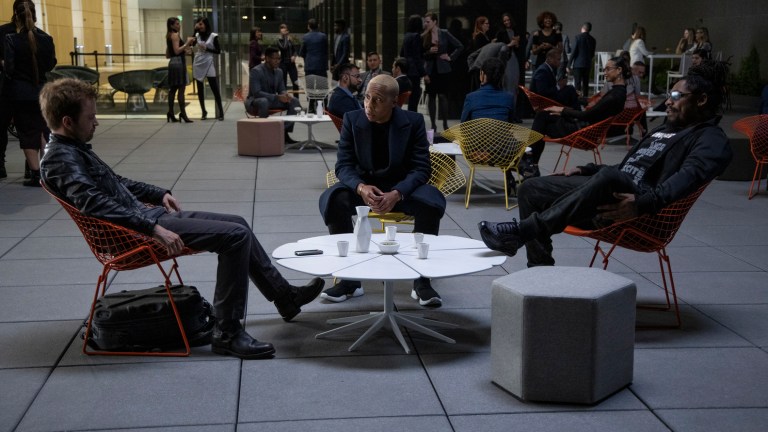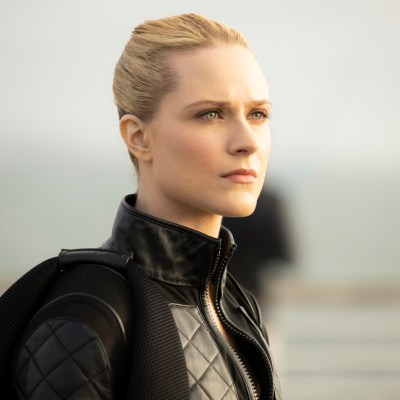Westworld Season 3 Episode 1 Review: Parce Domine
Westworld enters a brave new world in season 3 where every path is the path of least resistance.

This Westworld review contains spoilers.
Westworld Season 3 Episode 1
One of the strongest features of the greater world of Westworld is the fact that it’s so cold and impersonal. Not to a sterile degree, because that would mean it would be clean. This world is somehow dirty and still impersonal.
Witness, for example, a brief discussion Caleb (Aaron Paul) has with a job recruiter over his phone. The recruiter tells him he’s not a good fit, and when Caleb asks if there is anything he can do to make himself a better fit for a job, or to squeeze into an existing opening, there’s a stark realization. The HR flack Caleb has been talking with isn’t even a person, just a program designed to let him down easy.
Talk about a combination of terrible things. First, he doesn’t get the job he needs to keep him from turning to crime. Second, he can’t get any help to make himself a better candidate. Third, it’s a call from someone in HR. Four, it’s a robo-call on top of all that. That’s the ultimate in impersonal! (As someone who has worked in HR and who has done hiring, I’ve had a lot of terrible, impersonal conversations with people trying to reach my human side, and it left me profoundly depressed; I can only imagine what Caleb is going through in the wake of that phone call.)
It clearly isn’t a lack of resources that triggers this coldness. Everyone gets what’s coming to them according to the whim of the great artificial intelligence, Rehoboam. For those not up to date on their Old Testament, Rehoboam was the first king of Judah after Israel split into two kingdoms and went into a civil war; he also did battle with the kingdom of Egypt, as if a civil war wasn’t enough on his plate.
Certainly, that name wasn’t picked at random by Westworld showrunners Lisa Joy and Jonathan Nolan; Rehoboam is established during the non-host parts of the program as the reason why society seems to run so smoothly, and also why someone like Caleb, who has plenty of positives on his resume, can’t get above his station. Like the hosts, he’s stuck on his own path, but unlike the hosts, as one of Liam Dempsey’s (John Gallagher Jr.) friends says, humans don’t have the decency to revolt and kill everyone.
Fortunately, humans won’t have to, because if Dolores (Rachel Evan Wood) gets her way, hosts will do all the killing for them.
One of the most interesting aspects of the first episode of the third season of Westworld is how, almost immediately, Dolores is established as a gray character. She’s a villain, certainly—she kills a man in his own home after tormenting him, though she tells his wife that she’s set her free. She’s supportive and comforting to Liam, and yet she’s manipulating him from the very beginning. It’s strange to feel so conflicted about what is probably the main character. As has been shown, she’s got legitimate grievances with the human race from her time as a host; she’s seen people at their best and at their worst, and it was usually their worst. But she’s also trying to kill humans (this might be too simplistic a take) and take over the world, which, as a human, I’m not a big fan of.
One of the things that makes Dolores work as a character is the performance of Evan Rachel Wood. She’s so capable of turning on the farmer’s daughter act, to get attention or to catch people off guard, but also so quick at turning it off, or making sure the feeling never reaches her eyes. She’s a great performer, and while some of her lines aren’t the greatest this episode, she delivers them well and serves as a great counterpoint to Bernard, who Jeffrey Wright makes somehow more human than even the humans around him. Bernard knows he’s not a human, he knows he’s a host, and yet he’s terrified that he’s going to become just like Dolores, or a pawn in Dolores’ game that he’s afraid to use his power, save to defend himself.
Like watching Wood turn on the charm, watching Jeffrey Wright turn off Bernard’s emotions at the press of a button is instantly arresting. His face goes so slack, his eyes so dead, that what could be cheesy in the wrong hands is instead threatening and bold. Bernard without his humanity is somehow more dangerous than Dolores doing her best impression of the Terminatrix, because he doesn’t get any pleasure out of what he has to do. Bernard is simply trying to survive in a very cold world that cares little for the survival of humans or hosts, and he seems to feel bad about doing harm, even to people who are actively hurting him.
Jonathan Nolan does a stellar job with the actors, highlighting the artifice of both hosts at every turn. Watching Dolores drag a body effortlessly by one leg is a beautiful, simple way to put across the point that she may look like a sweet painter, but she’s not. Ditto the way Bernard, ever the slightly nerdy guy even when hiding out on a cattle farm, morphs from the weak, cowering figure just trying to skulk out of sight to a genuine bad ass who dispatches two larger men with ease. One embraces being more than human, and the other hides from it, and that’s brilliantly communicated by all parties involved.
Nolan also has a deft touch with making the show look good, too. The blend of fascinating locations, mostly in Los Angeles and Singapore, and special effects is seamless. The flying auto-jets look as functional as the motorcycle Dolores recruits to her cause (which looks like the motorcycle from the movie Warrior of the Lost World) or the self-driving taxis that carry people from place to place, presumably controlled by an app of some sort. If they have an app for petty crimes—the RICO app might be my favorite invention on the show—they surely have apps for everything else, and the use of the Rehoboam monitoring system as a convenient way to globe hop without using title cards is a very clever way to add a little geographical structure to a spread-out show.
“Parce Domine” isn’t a home run out of the gate. Lisa Joy and Jonathan Nolan use a few too many cliches when coming up with Caleb’s character (who is both a veteran with PTSD, grieving a lost friend, AND a son taking care of a mother with Alzheimer’s). Not all of Dolores’s pronouncements work as well as her opening scene terrorizing one of the major investors in Delos out of his fortune. But the show recovers from those stumbles with some brilliant action sequences and great performances from the three lead actors of Wood, Wright, and Paul. Soft material can, and is, elevated in the capable hands of the show’s ensemble, and the groundwork is laid for something much more special to come.
Establishing a world in an hour is a difficult task, no matter how skilled the cast and crew of a show is, but Westworld doesn’t fall short on that account. This is immediately a fascinating world, just far enough in the future to explain away sentient robots and an ominous computer AI ball that controls everything, but not so far in the future that there aren’t cell phones, blue tooth earpieces, ATM machines, and Fiverr for thugs. The rest of it will fall into place, and back story will become just that – color for a more interesting character going forward.


